|
|
|
Sort Order |
|
|
|
Items / Page
|
|
|
|
|
|
|
| Srl | Item |
| 1 |
ID:
117483
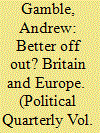

|
|
|
|
|
| Publication |
2012.
|
| Summary/Abstract |
The largest ever rebellion of Conservative MPs on Europe took place in October 2011 with 81 Conservative MPs defying the Conservative whip to vote for a referendum on Britain's continued membership of the European Union. This resurgence of dissent over Europe has been fuelled by the crisis in the eurozone. The Conservative party is now an overwhelmingly Eurosceptic party, but Conservative Eurosceptics are divided over whether the Government should use the opportunity of the eurozone crisis to take Britain out of the European Union, or whether it should seek to negotiate a looser arrangement, or do nothing at all. Conservative policy on Europe has been further complicated by the coalition with the Liberal Democrats, and by the consequences for the British economy if the eurozone disintegrates. Public opinion is also divided. British policy on the European Union remains ambivalent and muddled because British aims are inconsistent, and because there is no consensus on where Britain's interests truly lie.
|
|
|
|
|
|
|
|
|
|
|
|
|
|
|
|
| 2 |
ID:
158178
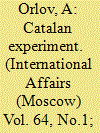

|
|
|
|
|
| Summary/Abstract |
On October 1, the regional powers - the government and the Parliament of Catalonia - carried out a referendum on independence from Spain. The Spanish government (that had gone to all lengths to prevent it) declared its results null and void. Prime Minister of Spain Mariano Rajoy dismissed it as a "democratically deplorable spectacle.
|
|
|
|
|
|
|
|
|
|
|
|
|
|
|
|
| 3 |
ID:
149711
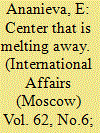

|
|
|
|
|
| Summary/Abstract |
THE EU REFERENDUM exposed a deep-cutting split in British society along the regional, age, social, educational, and, on the whole, class lines (the latter forgotten in the years of economic prosperity of postindustrial society).1 David Cameron organized the referendum in a hope to keep the Conservative Party united, to achieve reconciliation on the nationwide scale and bury the issue for at least another generation. The referendum, however, revealed the strengthening and so far latent trends of the last twenty years, which cropped up as the consistently mounting success of the United Kingdom Independence Party (UKIP) at the local, parliamentary and European parliamentary elections. In 2015, the "unfair" majority system left UKIP with one seat in the Commons (the system of proportional representation would have brought over 60 UKIP deputies to Westminster that corresponded to 12.6% of the gained votes).2
|
|
|
|
|
|
|
|
|
|
|
|
|
|
|
|
| 4 |
ID:
134018
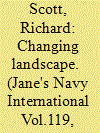

|
|
|
|
|
| Publication |
2014.
|
| Summary/Abstract |
In the run up to the Type 26 main investment decision, plans are taking shapes for a modernized complex warship capability on the Clyde. Yet there remains an element of uncertainty ahead of Scotland's referendum on independence.
|
|
|
|
|
|
|
|
|
|
|
|
|
|
|
|
| 5 |
ID:
170733
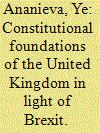

|
|
|
| 6 |
ID:
153289
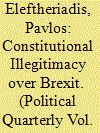

|
|
|
|
|
| Summary/Abstract |
Members and supporters of the British government say that the only constitutionally legitimate course of action over Brexit after the referendum is to press ahead with withdrawal from the European Union, even if that would entail the complete severance of all ties (which we normally call ‘hard Brexit’). A more sophisticated view of the constitution, however, shows that these more or less populist arguments are false. As the Supreme Court confirmed in the recent Gina Miller judgment, the constitution did not change with the June referendum. Parliament is still supreme and determines both ordinary legislation and constitutional change. In fact, if one examines closely the claim that the referendum entails hard Brexit, it becomes obvious that this claim is false as well. The referendum opened the door for one among four different possibilities. Which Brexit option—if any—the United Kingdom should take is a matter for Parliament now to decide, following the normal processes of democratic deliberation and representation.
|
|
|
|
|
|
|
|
|
|
|
|
|
|
|
|
| 7 |
ID:
127618
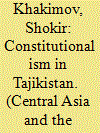

|
|
|
|
|
| Publication |
2013.
|
| Summary/Abstract |
This article examines how constitutionalism is taking shape in present-day Tajikistan and analyzes its main development stages in 1994 (the drawing up and adoption of the first RT Constitution), 1999 (the constitutional reform), and 2003 (the introduction of amendments and additions to the current RT Constitution).
This study defines the general features of constitutionalism of the transition period, which include the following:
1. The broad reception of foreign law, as well as implementation of the international legal provisions of human rights, the democratic foundations of statehood, the separation of powers, and the rule of law while retaining the regulations passed down from Soviet times.
2. The general contradictoriness and inconsistency of the constitutional rulemaking.
3. The transformation of certain provisions of the Constitution into a declaration of intentions, relating to their lack of correspondence to the real political and socioeconomic situation in the country.
It reveals the lack of correspondence between the content of the Constitution and the old legislation largely inherited from the Soviet past and presents the content of the constitutional reform carried out in 1999 within the framework of executing "The General Agreement on Establishing Peace and National Consent in Tajikistan."
The author analyzes the amendments and additions to the Constitution, the adoption of which was brought up at the 1999 referendum.
The article presents an appraisal of the constitutional reform of 2003 and examines the problems of carrying it out, during which favorable conditions were created for the emergence of authoritarianism in the country.
It also notes that Tajikistan's sociopolitical reality creates prerequisites for differences between the de jure and de facto constitution. This usually leads in practice to a certain shift from democracy to authoritarian methods of executing state power.
|
|
|
|
|
|
|
|
|
|
|
|
|
|
|
|
| 8 |
ID:
123041
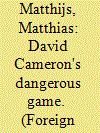

|
|
|
|
|
| Publication |
2013.
|
| Summary/Abstract |
Despite his innate caution and usually sound political instincts, British Prime Minister David Cameron is gambling with his country's future. In January, in a long-anticipated speech, he called for a wide-ranging renegotiation of the terms of the United Kingdom's membership in the European Union and promised to put the result up for a straight in-or-out popular referendum by the end of 2017 (assuming his party wins the next election, due in 2015). A British exit from the EU is now more likely than ever -- and it would be disastrous not only for the United Kingdom but also for the rest of Europe and the United States.
|
|
|
|
|
|
|
|
|
|
|
|
|
|
|
|
| 9 |
ID:
153290
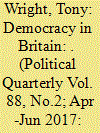

|
|
|
|
|
| Summary/Abstract |
The EU referendum has raised questions about the nature of democracy, which is not just majority rule. It is wrong to claim that direct democracy has now replaced representative democracy, as Parliament is required to answer all the questions that the referendum did not. The conduct of the referendum reflected the worst aspects of Britain's political culture of sterile adversarialism. Both left and right have shared assumptions about governing that have made it difficult to develop a culture of democratic citizenship. The political system still reflects its pre-democratic origins (as in the survival of a House of Lords and the obsession with titles) and the role of money in politics represents a form of corruption. Institutional reforms depend for their success on the nurturing of a democratic culture, which is a task for many hands.
|
|
|
|
|
|
|
|
|
|
|
|
|
|
|
|
| 10 |
ID:
153288
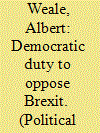

|
|
|
|
|
| Summary/Abstract |
What should be the position of democrats in response to the Brexit referendum? Many urge a duty to accept the result. This article argues the contrary. If someone is a UK citizen, has a belief that leaving the European Union will be damaging to the common good of the UK and is a convinced democrat, then that person has a duty to oppose Brexit. Neither of the two principal reasons for accepting the result—a claim of popular sovereignty or of parliamentary sovereignty—imply a duty not to continue to oppose. Arguments from political equality for simple majority rule do not apply when the alternatives are ill defined. More generally, popular sovereignty presupposes and does not replace constitutional democracy, and in a parliamentary democracy there is always a continuing right to oppose.
|
|
|
|
|
|
|
|
|
|
|
|
|
|
|
|
| 11 |
ID:
178823


|
|
|
|
|
| Summary/Abstract |
Our paper critically assesses the trajectories of nuclear energy policy-making in Taiwan and South Korea through the lens of state-led democratic innovation. Nuclear energy is as controversial as the associated decision-making highly political, raising concerns with democratic participation. Generally, deliberative polls and referenda are considered more bottom-up and grassroots approaches to resolving complex energy issues. In Taiwan and South Korea, however, the state plays a key role in deciding what issues and decisions should be debated, and exercises control over the interpretation of the results. The strong state and centralised decision-making over energy policy means the processes in Taiwan and Korea differ markedly from Western energy transitions. These approaches not only undermine the credibility of the participatory process and the quality of civic engagement, but further polarise public opinion. The overall aim in producing this paper is to identify the how democratic participation differs between established Western democracies and East Asia's new democracies, and to investigate how deliberative polls and referenda were used not as a means to reflect public opinions on energy policy, but as a conduit for political actors to promote their own political agendas.
|
|
|
|
|
|
|
|
|
|
|
|
|
|
|
|
| 12 |
ID:
178824


|
|
|
|
|
| Summary/Abstract |
Our paper critically assesses the trajectories of nuclear energy policy-making in Taiwan and South Korea through the lens of state-led democratic innovation. Nuclear energy is as controversial as the associated decision-making highly political, raising concerns with democratic participation. Generally, deliberative polls and referenda are considered more bottom-up and grassroots approaches to resolving complex energy issues. In Taiwan and South Korea, however, the state plays a key role in deciding what issues and decisions should be debated, and exercises control over the interpretation of the results. The strong state and centralised decision-making over energy policy means the processes in Taiwan and Korea differ markedly from Western energy transitions. These approaches not only undermine the credibility of the participatory process and the quality of civic engagement, but further polarise public opinion. The overall aim in producing this paper is to identify the how democratic participation differs between established Western democracies and East Asia's new democracies, and to investigate how deliberative polls and referenda were used not as a means to reflect public opinions on energy policy, but as a conduit for political actors to promote their own political agendas.
|
|
|
|
|
|
|
|
|
|
|
|
|
|
|
|
| 13 |
ID:
169127
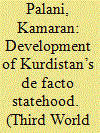

|
|
|
|
|
| Summary/Abstract |
This research aims to analyse the drivers which informed the decision and timing of Kurdistan’s independence referendum on 25 September 2017. Here we argue that any proper examination of these drivers must begin by investigating the relationship between the fight to counter the Islamic State begun in 2014, the disputes arising as a result of Kurdistan’s presidential election issue in 2015 and the internal political rivalry exacerbated by the question of whether to hold a referendum. The findings of this article highlight the centrality of de facto entities’ internal governance in their struggle towards statehood. The fight against IS served as a primary driver in influencing the timing and the approach of the September 2017 referendum. While the 2015 political deadlock resulting in the illegal extension of Barzani’s presidency was not a determining factor leading to the referendum, nonetheless it quickened the process and influenced the timing.
|
|
|
|
|
|
|
|
|
|
|
|
|
|
|
|
| 14 |
ID:
183361
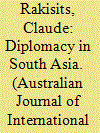

|
|
|
|
|
| Summary/Abstract |
In this Commentary, I propose a bold, four-step plan which would address the question of self-determination for Kashmiris and hopefully resolve permanently the 70-year-old Kashmir issue which has poisoned Indo-Pakistan relations since Partition. Two important elements of this plan would be: first, the involvement of the Commonwealth Eminent Persons Group to assist Kashmiris, Pakistan and India in the mediation of the plan; and, second, the holding of four UN-supervised referenda which would be held simultaneously but counted separately: Gilgit-Baltistan and Azad Kashmir; Kashmir valley; Jammu; and Ladakh. All Kashmiris would have three options: Join Pakistan, Join India or independence. As an incentive to India and Pakistan, the international community would deliver substantial economic assistance for the development of all parts of Kashmir. But as a quid pro quo for the economic aid package, there would have to be guaranteed free movement of people, capital and goods between all parts of Kashmir after the referenda, regardless as to which option had been chosen by the Kashmiris.
|
|
|
|
|
|
|
|
|
|
|
|
|
|
|
|
| 15 |
ID:
129963
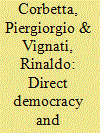

|
|
|
|
|
| Publication |
2014.
|
| Summary/Abstract |
Italy is one the most europhile countries in the European Union. Nevertheless, as surveys show, over the last few years anti-European sentiments have increasingly surfaced among Italian citizens. Furthermore, there is now an important novelty regarding the relation between Italy and Europe: the Movimento 5 Stelle (The Five Star Movement), a new party that expresses a peculiar and contradictory position towards Europe. Its leader, Beppe Grillo, sometimes advocates more, not less, unification, but he also proposes a referendum on Italian membership of the euro. Moreover, Grillo's blog frequently lends its voice to the choir of openly anti-European sentiment. Indeed, Grillo's call for direct democracy is plebiscitarian and his positions contribute to the weakening of a European project that is already facing grave difficulties of its own.
|
|
|
|
|
|
|
|
|
|
|
|
|
|
|
|
| 16 |
ID:
131131
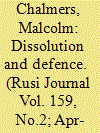

|
|
|
|
|
| Publication |
2014.
|
| Summary/Abstract |
A Yes vote in the September referendum on Scotland's independence would have considerable consequences for the armed forces, both in the rest of the UK and in the newly independent state. Malcolm Chalmers analyses recent developments in the Scottish defence debate, assessing issues such as the proposed size of the armed forces, budgets, timelines, and the prospects for the defence industry.
|
|
|
|
|
|
|
|
|
|
|
|
|
|
|
|
| 17 |
ID:
160810
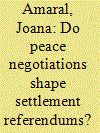

|
|
|
|
|
| Summary/Abstract |
Peace negotiations have traditionally aimed at reaching a negotiated settlement between political representatives in conflict settings. However, these settlements have seldom been rejected in referendums. This article uncovers whether the way peace negotiations are conducted influences peace settlement referendum outcomes in order to determine if and how they can better foster public support for peace settlements. It analyses and compares if and how specific characteristics of the Annan Plan and the Good Friday Agreement negotiations influenced the rejection of the former in 2004, and the acceptance of the latter in 1998, in their respective referendums in Cyprus and Northern Ireland. Through the qualitative analysis of elite interviews and documental data, it demonstrates that political inclusivity, civil society engagement and the public exposure of the negotiations shaped the opposing outcomes of the two cases, as well as differences in the support given by the local communities. It argues that peace settlement referendums require less secretive and more inclusive negotiation processes, which can better foster political support and civic mobilisation, and inform and engage the wider communities at earlier stages of the peace process.
|
|
|
|
|
|
|
|
|
|
|
|
|
|
|
|
| 18 |
ID:
167903


|
|
|
|
|
| Summary/Abstract |
In March 1975 Britain quarrelled about whether to hold a referendum on membership of the European Community. The Hansard Society organised an important debate about it between Enoch Powell, Geoffrey Howe, John Mackintosh and Keith Kyle. This is a report on that event drawn from a recently discovered recording. Many of the arguments deployed then are being repeated in today's debate about a ‘people's vote'—including the long‐term effects on the UK's constitution of having recourse to the referendum device.
|
|
|
|
|
|
|
|
|
|
|
|
|
|
|
|
| 19 |
ID:
186522
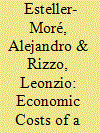

|
|
|
|
|
| Summary/Abstract |
Due to the pro-independence demands of part of its electorate, the political fit of Catalonia within Spain has given rise to notable political tensions over the last few years. This conflict has progressively affected several dimensions of Catalan society, including, potentially, the economy. The illegal referendum on independence, held in October 2017, marked the climax of political and social tensions, leading to a Constitutional crisis and further stoking the conflict as opposed to offering any hope of an early resolution. We analyze a complete set of margins potentially affected by the referendum, including real (aggregate demand and supply) and financial responses. Using a synthetic control method, we find strong evidence of the outflow of short-term bank deposits after the referendum; while, on the real side, we find evidence of responses in aggregate supply (number of capital increases and number of new firms registered).
|
|
|
|
|
|
|
|
|
|
|
|
|
|
|
|
| 20 |
ID:
145556


|
|
|
|
|
| Summary/Abstract |
In the 1975 referendum England provided the strongest support for European integration, with a much smaller margin for membership in Scotland and Northern Ireland. By 2015 the rank order of ‘national’ attitudes to European integration had reversed. Now, England is the UK's most eurosceptic nation and may vote ‘Leave’, while Scotland seems set to generate a clear margin for ‘Remain’. The UK as a whole is a Brexit marginal. To understand the campaign, we need to make sense of the dynamics of public attitudes in each nation. We take an ‘archaeological’ approach to a limited evidence-base, to trace the development of attitudes to Europe in England since 1975. We find evidence of a link between English nationalism and euroscepticism. Whatever the result in 2016, contrasting outcomes in England and Scotland will exacerbate tensions in the UK's territorial constitution and could lead to the break-up of Britain.
|
|
|
|
|
|
|
|
|
|
|
|
|
|
|
|
|
|
|
|
|